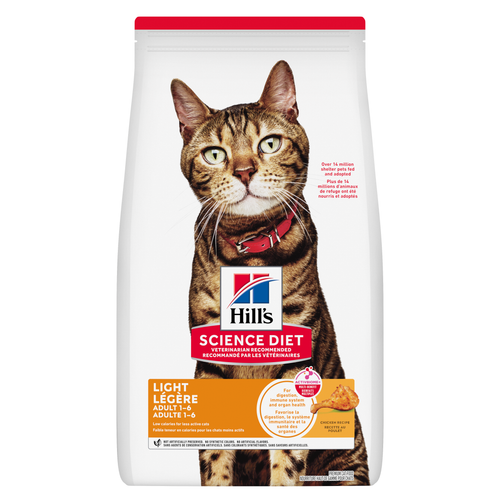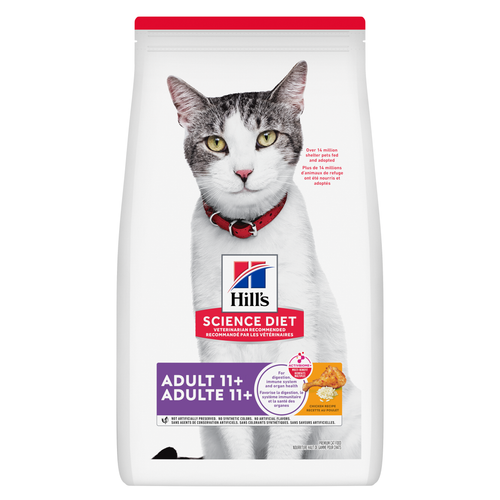
-
Find the right food for your petTake this quiz to see which food may be the best for your furry friend.Find the right food for your petTake this quiz to see which food may be the best for your furry friend.Featured products
 Adult Healthy Mobility Small Bites Chicken Meal, Barley & Brown Rice Recipe Dog Food
Adult Healthy Mobility Small Bites Chicken Meal, Barley & Brown Rice Recipe Dog FoodAdvanced nutrition to support hip & joint health from day 1
Shop Now Adult Light Large Breed Chicken Meal & Barley Recipe Dog Food
Adult Light Large Breed Chicken Meal & Barley Recipe Dog Food18% lower calories vs. Science Diet Large Breed Adult
Shop Now Adult Sensitive Stomach & Skin Small & Mini Chicken Recipe Dog Food
Adult Sensitive Stomach & Skin Small & Mini Chicken Recipe Dog FoodHill's Science Diet Sensitive Stomach & Skin Small & Mini dry dog food is tailored nutrition for Small & Mini dogs while being gentle on stomachs. Nourishes skin & promotes a lustrous coat.
Shop NowFeatured products Adult Light Chicken Recipe Cat Food
Adult Light Chicken Recipe Cat Food20% lower calories vs. Hill's Science Diet Adult
Shop Now Adult 11+ Chicken Recipe Cat Food
Adult 11+ Chicken Recipe Cat FoodSupports brain health & beautiful fur. Helps keep immune system, heart & kidneys healthy.
Shop Now Adult Healthy Cuisine Seared Tuna & Carrot Medley Cat Food
Adult Healthy Cuisine Seared Tuna & Carrot Medley Cat FoodDelicious seared tuna paired with tender carrots in a mouthwatering sauce
Shop Now -
Dog
- Dog Tips & Articles
-
Health Category
- Weight
- Food & Environmental Sensitivities
- Urinary
- Digestive
- Joint
- Kidney
- Dental
- Cancer
-
Life Stage
- Puppy Nutrition
- Adult Nutrition
- Senior Nutrition
Cat- Cat Tips & Articles
-
Health Category
- Weight
- Skin & Food Sensitivities
- Urinary
- Digestive
- Kidney
- Dental
- Stress
- Cancer
-
Life Stage
- Kitten Nutrition
- Adult Nutrition
Featured articles Antioxidants
AntioxidantsUnderstand the importance of antioxidants in your dog or cat's food, and how they can help protect your pet and keep them healthy.
Read More Importance of DHA in your Pet's Food
Importance of DHA in your Pet's FoodLearn about DHA, Docosahexaenoic Acid, a natural omega-3 fatty acid that is essential in the development of the brain and nervous system in cats & dogs.
Read More Water
WaterDiscover why water is the most important nutrient for your dog or cat to live a healthy life. Find out how much water your pet should consume each day.
Read More -


Heart murmurs in dogs may be identified during routine exams when a veterinarian uses a stethoscope to listen to a dog's heart. If your dog has a heart murmur, instead of hearing the usual "lub-dub" sound, your vet may hear a "whoosh" sound. Not all causes of dog heart murmurs are a cause for concern; however, if your vet notices one in your dog, it's important to know what's causing the murmur and whether the condition needs to be treated. Here's more on what heart murmurs are, what causes them and how they can be treated.
What Is a Heart Murmur in Dogs?
When your veterinarian listens to your dog's heart with a stethoscope, part of what they listen for is a classic "lub-dub" sound that suggests that your dog's heart valves are opening and closing properly. These heart valves open and close in a synchronized manner that allows blood to be pumped to the lungs and the rest of the body without ever flowing in the wrong direction. However, whenever blood flows the wrong direction through the heart, which can be due to things such as impaired heart valve function or heart muscle defects, vets will hear this as a turbulent "whoosh" sound, also known as a heart murmur.
Vets identify heart murmurs based on the intensity of what they hear when they listen to the heart — a "1" rating would indicate the softest murmur while a "6" would be rated as the loudest. However, the volume of the murmur has no correlation with the severity of the condition causing the murmur; it's simply one method that vets use to record the murmur over time to see if it changes.

While heart murmurs may be indicative of heart disease or other conditions, they aren't always a cause for concern. For example, puppies may have an "innocent heart murmur" that they're born with. But, once they're about four months old, the murmur disappears without any treatment. In contrast, a heart murmur in a senior dog may be due to a valve disease, requiring vet treatment and monitoring. Depending on the cause of the heart murmur, your vet may elect to monitor your dog or may recommend additional testing and treatment.
Causes of Dog Heart Murmurs
Anything that causes abnormal blood flow within the heart can cause a murmur. Here are the most common causes of heart murmurs in dogs:
- Leaky heart valve: A dog's heart has four chambers: left and right atria, and left and right ventricles. In between these chambers are valves that open and close to let blood flow normally through the heart. Leaky valves in the heart are the most common cause of heart murmurs in dogs. Common breeds at risk for this disease include Cavalier King Charles Spaniels, cocker spaniels, poodles and chihuahuas.
- Heart Muscle Disease (Cardiomyopathy): In dogs, this is most often caused by a weakening of the heart muscle's walls, resulting in turbulent blood flow and a murmur. Breeds at risk for this condition include Dobermans, boxers and giant breed dogs.
- Cancer: A tumor anywhere inside the heart can cause turbulent blood flow and a murmur.
- Congenital heart defects: There are a wide variety of congenital heart defects in dogs that can result in heart murmurs. A few of the more common congenital heart defects include: patent ductus arterious (PDA), which is seen in many breeds including German Shepherds, Maltese, poodles and Yorkshire Terriers; pulmonic valve stenosis (narrowing), which is commonly seen in English Bulldogs; and aortic valve stenosis (narrowing), which may be seen in breeds such as Golden Retrievers and Rottweilers.



Tasty Tips
Clinical Signs of a Heart Murmur in Dogs
Unless a dog is experiencing heart failure, there are often no signs associated with heart murmurs in dogs. In fact, many dog parents are surprised when their vet detects a heart murmur during a routine physical exam. If a dog has been diagnosed with a heart murmur, be aware of the clinical signs of heart failure, which can include:
- Excessive tiredness or sleeping more
- Cough
- Rapid breathing, panting more, or breathing that sounds wet or congested
- Fainting or collapsing
- Pale or blue gums
- Potbellied appearance
- Weight loss
If you notice your dog showing any of these clinical signs, call your vet for advice immediately.
Diagnosing a Heart Murmur in Dogs
If your vet hears a murmur when they listen to your dog's heart, be prepared for additional testing. The most common test is a chest X-ray. This allows your vet to look at your dog's heart, lungs and pulmonary vessels, and it may assist in a diagnosis. However, only an echocardiogram (ultrasound of the heart) can confirm the source of a heart murmur as well as the characterization of the severity of the heart disease present. Additional tests that may be recommended based on your dog's individual case include bloodwork (internal organ function screen, complete blood count and heartworm test), blood pressure monitoring and an electrocardiogram (ECG) to check the electrical activity of your dog's heart.
Treating a Heart Murmur in Dogs
Treatment of heart murmurs in dogs depends on what's causing the murmur and whether it's negatively impacting your dog's life. If your dog isn't showing any signs of heart disease, there may be no treatment recommended. Your vet may elect to monitor your dog every couple of months and only treat your dog if they notice any clinical signs. If your dog was diagnosed with a heart murmur that's caused by a condition that can be corrected surgically, such as a PDA, then surgery will be recommended. If the heart murmur is due to anemia or heartworm disease, then that condition can be treated as well.
Leaky heart valves are managed with medication to help the heart pump blood more effectively. Dogs with many forms of heart disease can live reasonably normal lives as long as you know the signs that indicate your dog's heart needs some help (see above), give medications as prescribed and work with a vet you trust.
While having a heart murmur diagnosed in your dog may sound scary, it doesn't need to be. Many times, your vet can resolve the situation for you or work with you to maximize your dog's health and wellbeing. Your job as the pet parent is to stay informed and continue to bring your furry companion to your vet for routine exams.


Dr. Sarah Wooten graduated from UC Davis School of Veterinary Medicine in 2002. A member of the American Society of Veterinary Journalists, Dr. Wooten divides her professional time between small animal practice in Greeley, Colorado, public speaking on associate issues, leadership, and client communication, and writing. She enjoys camping with her family, skiing, SCUBA, and participating in triathlons.
Related products

18% lower calories vs. Science Diet Large Breed Adult

Hill's Science Diet Sensitive Stomach & Skin Small & Mini dry dog food is tailored nutrition for Small & Mini dogs while being gentle on stomachs. Nourishes skin & promotes a lustrous coat.

18% lower calories vs. Science Diet Adult

Advanced nutrition to support hip & joint health from day 1
Related articles

Your dog's coat and skin are a big part of your dog's overall health. Ensure you keep your dog's coat healthy, by following these simple tips.

Learn basic steps & precautions for treating a cut on your dog, including what you can put on the cut, and when you should take them to the vet.

Discover how the field of dog science is giving us more and more insights into the inner workings of our furry best friends.

Learn how dogs with sensitive skin can have special dietary needs, how they can develop over time in a healthy dog, and how Hill's dog food can help.

Put your dog on a diet without them knowing
Our low calorie formula helps you control your dog's weight. It's packed with high-quality protein for building lean muscles, and made with purposeful ingredients for a flavorful, nutritious meal. Clinically proven antioxidants, Vitamin C+E, help promote a healthy immune system.
Put your dog on a diet without them knowing
Our low calorie formula helps you control your dog's weight. It's packed with high-quality protein for building lean muscles, and made with purposeful ingredients for a flavorful, nutritious meal. Clinically proven antioxidants, Vitamin C+E, help promote a healthy immune system.

